I was at a meet and greet thrown by a prominent VC firm this week and it was quite enjoyable. There were friendly faces, conversations and a couple of folks huddled around a desk in the corner. Wait. That’s so not “social.” I went over to explore and what were they doing? Checking out virtual reality, of course. Ready or not, here it comes.
Trying to wade through the noise and hype that surrounds VR can be overwhelming, but there are clear real-world uses that make the future of the technology exciting. Lucid flew through that noise for me. The thing that’s going to bring the “future” to the “now” is a killer app that consumers can understand and more importantly afford.
That’s where Lucid comes in.
 The company has prototyped a point and shoot VR camera that is ridiculously easy to use, looks great, requires no post-production by the user and will cost $299. Sounds kind of crazy, doesn’t it? I thought so, and so does their team…which makes things even more interesting. I met with Lucid’s CEO, Han Jin, and we chatted about the future of VR as he sees it.
The company has prototyped a point and shoot VR camera that is ridiculously easy to use, looks great, requires no post-production by the user and will cost $299. Sounds kind of crazy, doesn’t it? I thought so, and so does their team…which makes things even more interesting. I met with Lucid’s CEO, Han Jin, and we chatted about the future of VR as he sees it.
Is Lucid just another wannabe “crowdfunded” company? Even though you’ll find the LucidCam on Indiegogo, I say “not even close.”
Why now?
Virtual reality continues to get a lot of momentum within tech circles (including entrepreneurs and investors), but the fight continues to get mainstream audiences excited about what’s to come. Google’s trying to change that with its Cardboard project and The New York Times shipped said Cardboard out to its readers along with the paper this week. YouTube’s also getting in on the act in a big way.
I watched an NBA game in VR and it was pretty cool. Lots of folks are playing games in a way that they dreamt about their entire lives. But what’s going to grip “middle America?” How’s mom going to get into VR?
That’s what interested me the most about Lucid.
Robots and prototypes
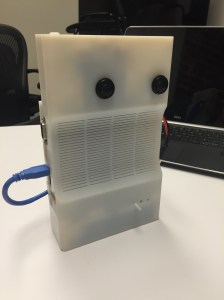 Jin and Lucid have raised an undisclosed amount of money from unnamed investors, but is driving interest with its LucidCam with an Indiegogo campaign that’s almost halfway to $100,000 with about 48 days left to go.
Jin and Lucid have raised an undisclosed amount of money from unnamed investors, but is driving interest with its LucidCam with an Indiegogo campaign that’s almost halfway to $100,000 with about 48 days left to go.
When Han and his his team were working on outfitting robots with cameras, they copied designs from security cameras. The robots did however get the team thinking about the idea of experiencing things in other places where they weren’t physically. Using an Oculus headset to drive it around in different offices outside of theirs. They prototyped and prototyped, then realized that the camera itself, shooting in VR, would be way more feasible than a robot…so they ripped its “eyes” out to work on the LucidCam. You can’t slide a robot into your pocket, you can’t take it to a Taylor Swift concert.
Plus, shooting 360 degree video in 2D strapped to a robot caused issues and might cause you to walk the thing right through a wall.
When I asked how he felt after he saw the first video with the robot’s VR eyes attached to an actual breadboard, Jin said:
It was a low-res video, shot and tested with a (Oculus) DK1. We took a video with our friend’s baby and the baby starts crawling towards you. The experience was immense. At that time, it was 1 1/2 years ago, everyone was into Oculus for gaming, mostly. We knew where we wanted to take this, after that first video.
 I sat through the demo and the mom tends to look over at you (the device, actually) and it’s not a big deal. And then the baby catches a glimpse and the device must have been at the perfect eye level, because it felt like it was crawling right at me while we made eye contact. I can imagine that this demo gets Lucid many followup meetings in the Valley.
I sat through the demo and the mom tends to look over at you (the device, actually) and it’s not a big deal. And then the baby catches a glimpse and the device must have been at the perfect eye level, because it felt like it was crawling right at me while we made eye contact. I can imagine that this demo gets Lucid many followup meetings in the Valley.
Lucid is building the Flip camera, but for VR. The Flip camera was hot way before Apple packed its mega camera into a tiny phone and took over the point and shoot photo and video market. Want to show it to someone? They download the Lucid app, drop their iPhone or Android phone into a Cardboard and check out the footage. No need to buy an expensive developer headset or even the Samsung Gear VR.
We did a quick walk around of the TechCrunch office in VR, using the LucidCam, and it was available to view within 10 minutes.
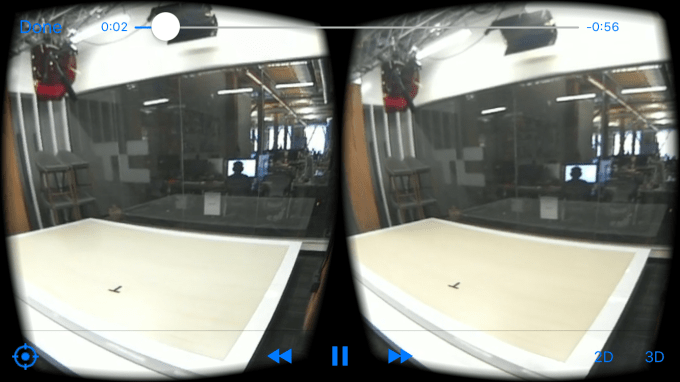
Design
“I wanted to build this for me” Jin told me.
Lucid’s industrial designer took his inspiration from a device a lot of use on a daily basis, the Apple Mouse.
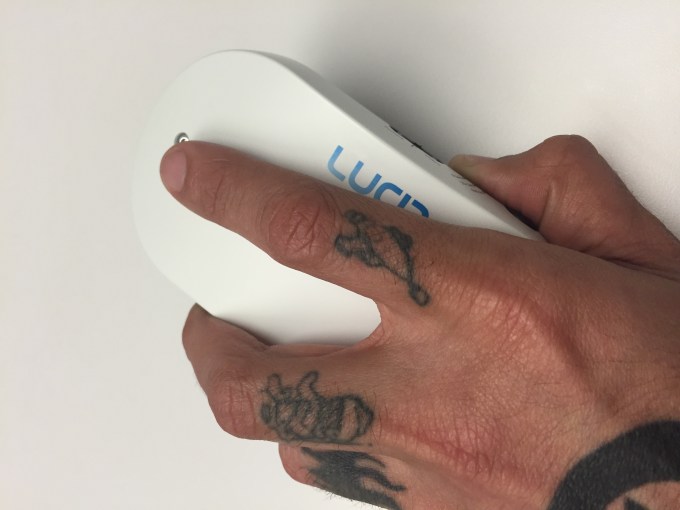
It’s a gorgeous device as it stands, it shoots in 180 degrees to stay away from the stitching issues that 360 degree video has. Again, we’re talking about consumer applications, taking the camera out of your pocket and shooting a moment at your kid’s soccer game. You don’t want to have to use a tripod, or turn around in circles while your kid is playing. It’s unnatural and really doesn’t make a difference once you see the final product out of Lucid’s technology. It’s slick and high-res. Going with 180 also helps keep file-size down. About a minute out of one of their cameras is only 35 megabytes…which is impressive and can be sent to people in a snap.
Keeping it small was important, because shooting in VR, with rigs like the upcoming Lucid kit, is not only expensive but takes up a ridiculous amount of time. Post processing takes 5 to 6 hours for some demos and Jin calls that ‘insanely painful.”
The Lucid has everything a big VR rig needs though, big Sony sensors that absorb all of the light and mics on either side to pick up stereo sound. What you’re missing are bells and whistles, though. Bells and whistles, like aperture control, that you probably don’t want anyways.
You run around with this thing like you would your phone. That’s important for capturing awesome moments.
Want to shoot in 360 and think the Lucid isn’t for you? Well, they thought about that too. Since the device itself is rounded on the edges, you can buy three of them and buy a special tripod that keeps them in a triangle formation:
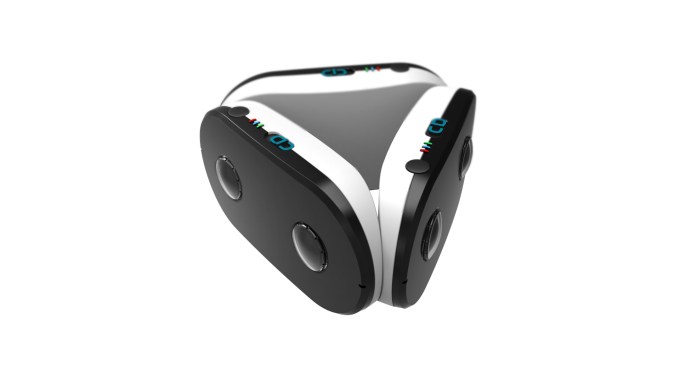
Smart.
The team
I love my job. Lucid CEO Han Jin
One of the things that Lucid says is an advantage for them is their ability to iterate quickly. They’re not a part of a big mothership of a company, they can literally change things 15-20 times a day and that’s how the process has been going. Right now the team is playing around with WiFi connectivity for the device for livestreaming. While it might not make it into the first iteration, which hopes to ship sometime early in 2016, it shows that Lucid is listening to early feedback.
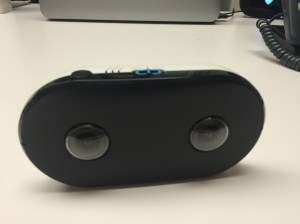 Jin likes sending his team out to shoot things like an Elton John concert, someone even took on the assignment of shooting their skydiving adventure. “Yep, R&D,” Jin said.
Jin likes sending his team out to shoot things like an Elton John concert, someone even took on the assignment of shooting their skydiving adventure. “Yep, R&D,” Jin said.
“I love my job.” he continued.
Another team member is going to a Miami Heat game next week. Armed with courtside seats, she’s going to not shoot the whole game, but try to get those great moments, like a dunk from Chris Bosh. Moments are where VR video consumption will take off. A movie…a documentary…a long experience is not where the masses will come. We don’t know how long we should wear headsets or look through these lenses at a time, but it can’t be hours at a time…I’ll tell you that from experience.
30 seconds of a basketball game? On loop? Like I’m actually there? Perfect.
Moms and the future
I asked Jin if his mom, who lives in Germany, understood what it was he was working on. She didn’t until he helped her use the app with Cardboard and sent her a message from here in the States.
“If what you’re working on makes you feel closer to me, then it’s OK.” she told Jin.
On the all-important manufacturing side, Jin says that China is a likely location where it’ll take place. They’re still making tweaks though, but not too many, because they want to stay around the $299 price point, which is a sweet spot for any type of point and shoot camera, let alone one that was built to shoot virtual reality. Things like waterproofing are going to wait.
Jin also tells me that a bigger round of funding is on the way, but he’s not in a rush, telling me “I know it’s going to take time, but consumer adoption will be slow.” Setting up the manufacturing is going to be “expensive” he also contends, which is where that round of funding comes in. Indiegogo isn’t going to be the end-all-be-all for the company, which is good to hear. Those who rely on the spiky buzz from campaigns like that tend to die fast.
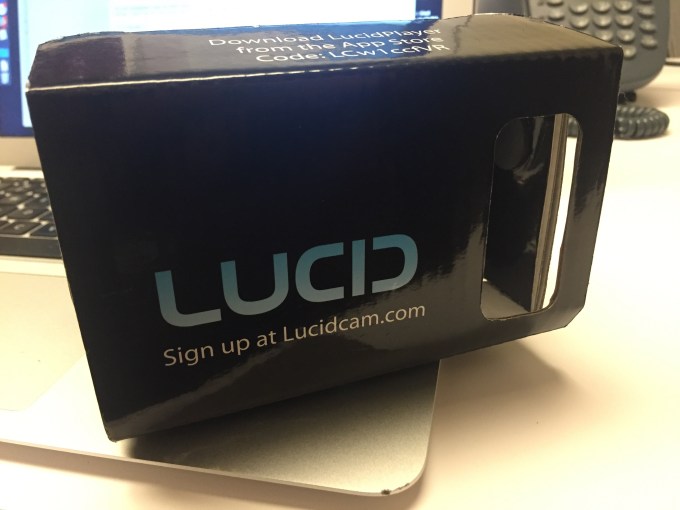
One interesting consumer for this product is production houses that have expensive rigs for VR. They can use the LucidCam to run out and get some test shots. No need to drag around 8 GoPros (or the six-figure futuristic Lytro Immerge), 8 Micro SD cards, or anything else that if something glitches, you get nothing. The Lucid is great for experimentation, too, in that way. Brands are also interested, wondering how they can quickly shoot VR content for people who are slowly ramping up into the virtual world.
The future is bright for Lucid, and as long as they keep having fun, the end product will reflect that.
It’s going to be an uphill battle, especially getting to the point of putting the first units in consumer’s hands. Technology is only as good as the number of folks who have it at their disposal. If Lucid takes things slow and easy, less on the slow side, they can build that Flip cam for VR. But can it successfully fend off a deathblow by Apple, which Flip didn’t? Early days, but interesting ones once you cut through the noise.
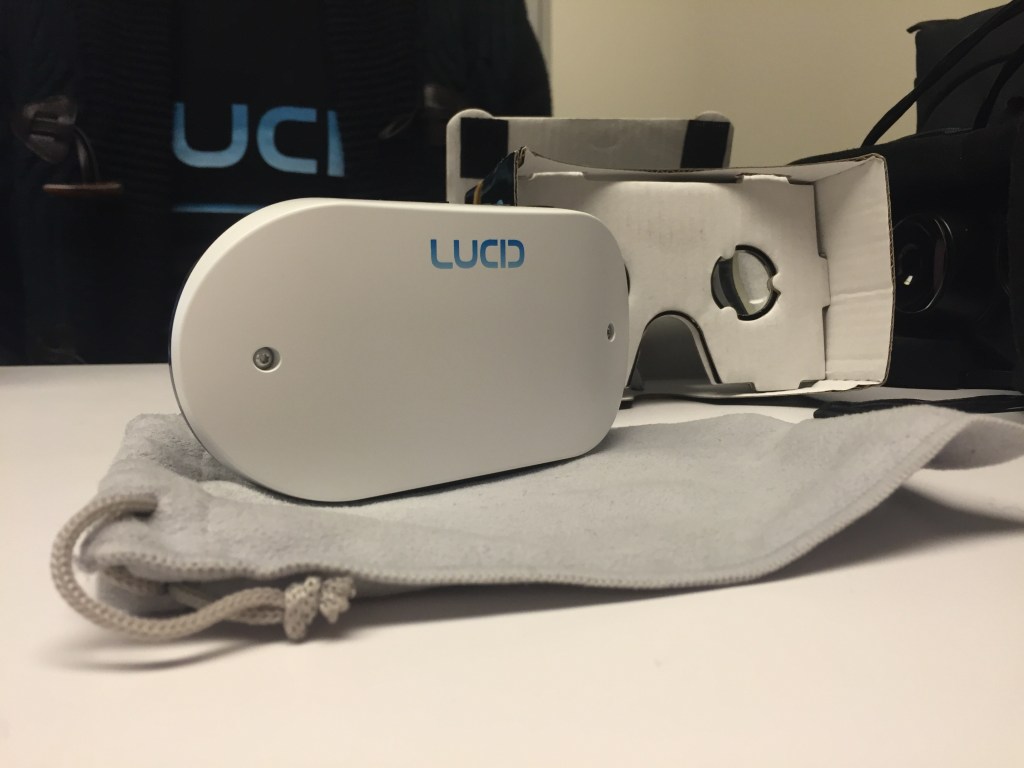



































Comment